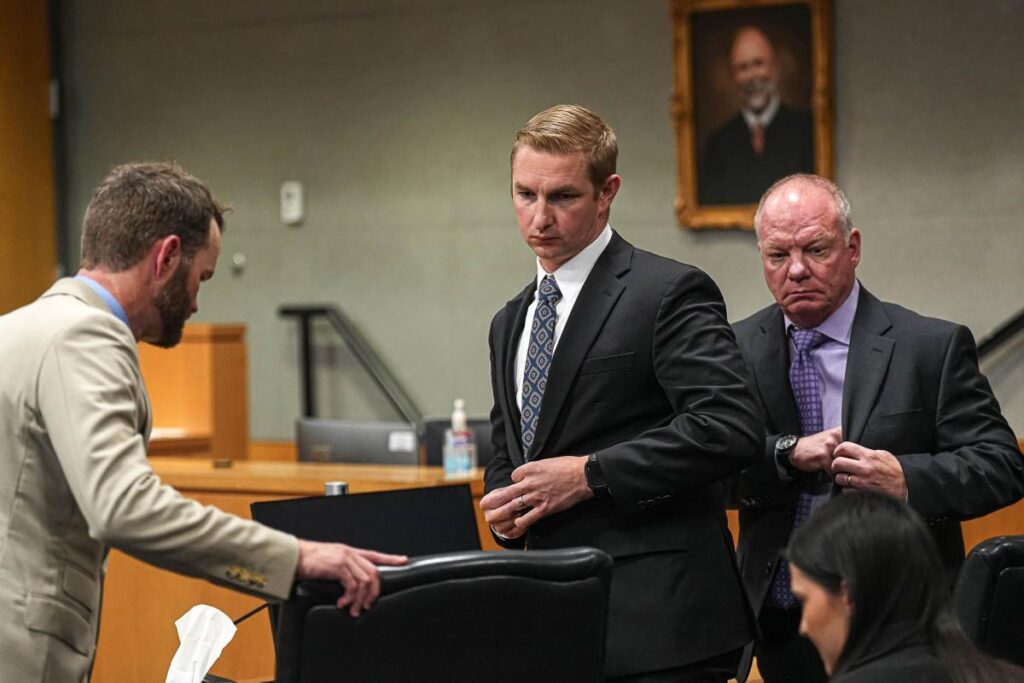On Saturday, Austin police officer Christopher Taylor was found guilty of deadly conduct in connection with the fatal 2019 shooting of 46-year-old Mauris DeSilva, marking a significant moment in law enforcement accountability in Travis County. This verdict is notably the first instance where an officer has been convicted for an on-duty shooting within the county, further emphasizing the evolving standards regarding police conduct. Taylor, a 10-year veteran, showed no visible emotion upon hearing the jury’s unanimous decision after four intense days of deliberation. The case surrounding DeSilva, who had struggled with mental health issues, involved police responses to a troubling situation where he posed a threat to himself with a knife.
The incident unfolded outside the Spring Condominiums in downtown Austin when police were alerted to DeSilva holding a knife to his neck. Upon arriving at the scene, officers Taylor and Karl Krycia engaged with DeSilva, who advanced toward them with the weapon despite the officers issuing verbal commands to de-escalate the situation. During the confrontation, shots were fired by the officers, resulting in DeSilva’s death. Concurrently, officer Krycia is facing charges of murder and deadly conduct related to the same case, underscoring the heightened scrutiny surrounding police use of force.
Taylor’s conviction is indicative of the ongoing transformation in the legal landscape concerning police accountability, propelling the office of District Attorney José Garza into the spotlight. His election was largely influenced by public demands for greater accountability in law enforcement, especially following high-profile incidents that sparked protests and calls for reform. Garza’s office has seen an unprecedented number of indictments against police officers, and Taylor’s conviction represents a significant victory for those advocating for justice in cases of police violence.
Despite the conviction, tensions remain between law enforcement representatives and the community. Officials from the Austin Police Association expressed concern that the verdict sets a harmful precedent for police officers, claiming that Taylor’s actions were aligned with established department and national training standards. They criticized the prosecution as disproportionate, especially in light of other cases of deadly conduct that have been overlooked by the district attorney’s office. This feedback hints at a broader debate within society about the standards for police conduct and the implications of holding officers accountable for their actions.
The trial’s proceedings were not without controversy, marked by multiple hearings concerning jury misconduct and safety concerns. Issues arose regarding jurors using electronic devices, prompting defense attorneys to request a mistrial—a motion that was denied. The intense environment surrounding the trial reflects the heightened public scrutiny that police conduct cases face, highlighting the deep societal divisions on issues of race, police violence, and mental health.
As the sentencing date for Taylor has yet to be determined, his attorneys have suggested that probation may be an appropriate sentence for the third-degree felony of which he has been convicted. The DeSilva family’s legal representatives have emphasized their continued grief over the loss of Mauris DeSilva and have filed a separate civil lawsuit against Taylor and the city, arguing that the police failed to care properly for a person undergoing a mental health crisis. They assert that this conviction represents a small step towards justice for their family, hoping that it may also foster a broader healing process in the community. It remains to be seen what this verdict will mean for the evolving relationship between policing, mental health, and societal expectations of law enforcement in Austin.

